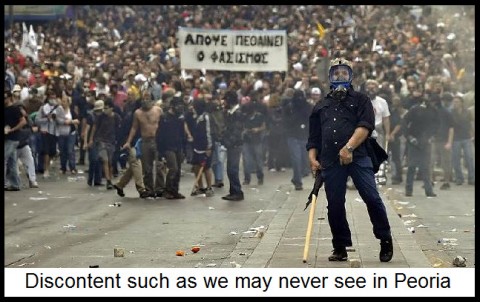Americans can take comfort in the likelihood that the showdown between mortgage lenders and homeowners will not resemble Greece’s battle-to-the-death with its creditors. In the U.S., the banks are slowly losing ground to a populist, election-year tide that eventually will force lenders to accept a moratorium on mortgage debt for tens of millions of homeowners. In the rapidly escalating legal battle to bring this about, last week’s $25 billion settlement between the banks and the U.S. did not settle much of anything, since the banks in theory can still be sued into oblivion by aggrieved homeowners. The plaintiffs will be claiming in effect and with a straight face that they got in over their heads because lenders forced them to borrow more than they could repay. Who would have imagined just a decade ago that an army of reckless borrowers would seek the protection of the courts under the remorseless deadbeat’s battle flag “Kick me, beat me, make me write bad checks”? That’s what it’s come down to, evidently, and woe to any bank that asks the court for help in turning a family out onto the street. The five big banks that signed onto the deal are undoubtedly running scared, since the legal latitude afforded those who could conceivably claim “questionable lending practices” has been widened to include just about anyone who lives in a home – including, presumably, tens of millions more homeowners who are not yet underwater but eventually will be. Keep in mind that the costs of the yet-to-be-unveiled Homeowner Bailout Act of 2014 have already been socialized, since the GSEs have been originating 90% of all new mortgage loans.
Contrast this with the increasingly dire situation in Greece, where lenders, backed by a docile and ignorant press, are still able to pretend that they have the upper hand. They made quite a show of this over the weekend, holding up the bailout money for Greece until the onerous terms of a paltry 130-billion euro loan are ratified by the Greek parliament. The idea was to bind future Greek leaders to the severe austerity measures on the table. While the wrangling continued on Sunday, a headline atop an Associated Press story shouted a dubious claim being made by Greece’s leaders – that the Cuts Will Avert a ‘Social Explosion’. More likely is that the cuts will briefly postpone the country’s collapse into a generation of penury. What would happen if Greece were to default? The following, according to the nation’s prime minister, Lucas Papademos: Greeks would lose their savings; the state would be unable to pay salaries and pensions; and shortages would occur in important items such as medicines, fuel and machinery. Under the circumstances, it’s easy to understand why Greece’s political leaders would want to keep kicking the can down the road. After all, anything seems preferable to letting the catastrophe that looms simply happen. In the meantime, a potential escalation of violence was foreshadowed by a statement made by Vasso Papandreou, a socialist and former member of the European Commission: “If we say we do not pay the bond that matures on March 20, all [Europeans] will rush to find a solution.” One of these days, we would bet, Greece seems certain to call the lenders’ bluff. On that day, we wouldn’t want to be caught short the U.S. dollar.
***
(If you’d like to have these commentaries delivered free each day to your e-mail box, click here.)


Look at VXX or TVIX. The smart money is hedging…aka getting nearer the doors in a smoky theater.